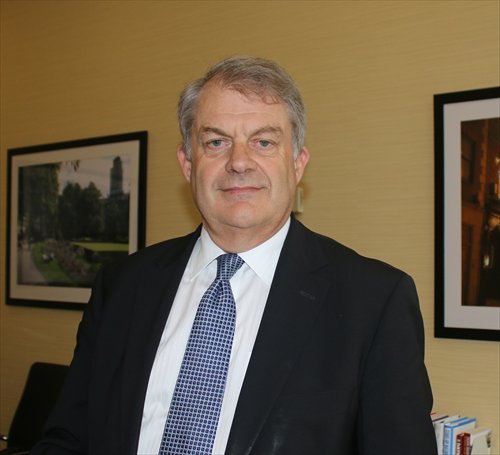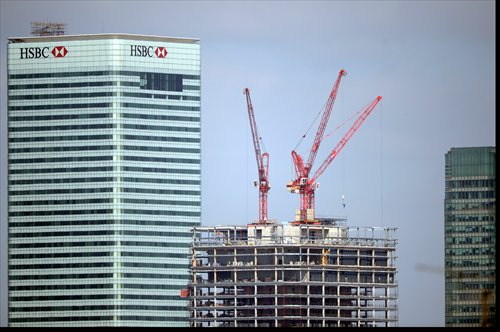Count us in
UK eyes opportunities, benefits from AIIB

Mark Boleat, policy chairman at the City of London Corporation Photo: Sun Wei/GT

An HSBC building and a construction site in London, UK Photo: CFP
Editor's Note:
The UK was the first G7 country to sign up to the China-backed Asian Infrastructure Investment Bank (AIIB) last week. The Global Times (GT)London correspondent Sun Wei on Thursday interviewed Mark Boleat (MB), policy chairman at the City of London Corporation, asking about the AIIB's potential impact on the current international financial system. The City of London Corporation is the municipal governing body of the City of London, a major business and financial center.
GT: What do you think of Britain's decision to join the AIIB, despite reported US pressure not to join?
MB: I would not call it US pressure on not joining it. The Americans wouldn't do that, although clearly they have taken a different view. The Americans don't have to do everything we do, and vice versa. I think that Britain's decision to join it was partly because they recognized this bank is a good idea and is going to do some useful work, and Britain wants to be part of it. Britain has strong trading links with Asia generally.
GT: How do you evaluate the two existing pillars of the Bretton Woods system - the World Bank and the IMF? After 70 years of history, do you think they need some kind of stimulation?
MB: The World Bank and the IMF have structures and standards that go back a long time to when they were set up. But the world has changed. We know the growing importance of China and its economy. The European Union is now operating as a single block. From time to time, they need to change. But changing an international institution is not easy.
I think they are pretty up to date. Like any organization, they need to navigate and review their structure, governance and operation. I once worked for the World Bank, and there is constant reevaluation of what they are doing and how they are doing it.
Britain has always been an enthusiastic supporter of international bodies, and the two were actually set up in London. So Britain is fully committed to the World Bank and the IMF. But that doesn't stop it from being committed to other international banks or aid agencies or support programs.
There is no particular suggestion that we would reduce support for the IMF or the World Bank. The AIIB is complementary to it, and will concentrate on infrastructure.
GT: It seems that both the US-dominated World Bank and the Japan/US-controlled Asian Development Bank (ADB) have failed to address the needs of emerging economies. What are the major obstacles for reform?
MB: The world has moved on and they have to move on with it. Other organizations can be created. In some cases, they may be created because people might think the existing organizations are not what they want. Sometimes the existing organizations will adapt. That's all part of a competitive market.
GT: Do you think the AIIB can bring positive changes to these institutions, or, in a broader sense, the global financial system?
MB: It's quite likely that it will. It's got a lot of publicity around the world. The fact that Britain has joined an Asian bank set up predominantly by China is highly significant. And now, clearly, other European countries and Australia are interested. It gives the bank very useful additional good publicity.
On promoting global financial governance capabilities, we have to wait and see a bit.
Britain has a lot of expertise in conducting large infrastructure projects. British firms and banks are heavily involved in major airport construction projects around the world. A lot of the financial deals for major infrastructure projects are done in London, even if the project is in South America or Asia. So there is a huge amount of expertise here already. And the British government has done a number of interesting things itself. I am sure the government also wants to be able to offer its experience of where things have worked and where they haven't.
GT: Can you elaborate more on Britain's interest in joining the AIIB?
MB: First of all, having looked at the bank, it seems to us to be a good job that needs doing, and therefore we'd like to get involved. It is also a political opportunity to demonstrate our strong commitment to countries in Asia. That's not saying we're forgetting America or Europe. We already have very strong links there. This will demonstrate our commitment to Asia.
There could also be more business for Britain, if there is more investment for new infrastructure. You are going to find British architects, British construction companies and banks [that would also be] interested to join.
Simply being involved will help to give more market opportunities. If there are more infrastructure projects in Asia, there's more business for British companies. If the AIIB contributes to economic development, it will be useful and British companies can benefit.
GT: What problems or challenges are there for the AIIB, and how can they be addressed?
MB: It's a new bank that hasn't done anything yet. The first thing is to actually build up expertise to be able to do things.
The bank must develop the right methodology for doing things, as well as project capability. It must find the right projects, and ways to finance them. All of that will take time. The European Bank for Reconstruction and Development - which was set up specifically to help with the development of Eastern European countries - could be a good model for the AIIB. Given the support behind it from China, Britain and other countries, I am sure they would find the necessary expertise; they would use consultancies and existing banks.
Setting it up is always one of the easiest things to do. But to be a successful bank, that is to lend money and get the money back, is harder. Announcing things is easy, but getting the bank actually up and running, lending money, doing things clearly, that's more challenging. Even now, there's a lot of work being done to set it up.